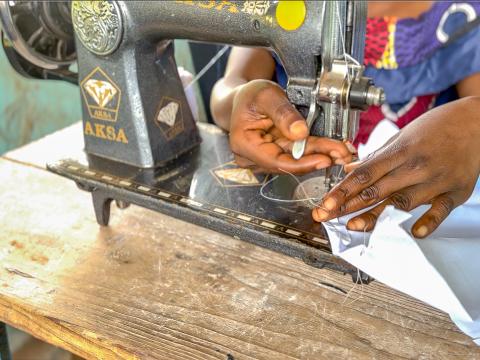DR Congo: From the fight against HIV to economic income-generating activities: An inspiring approach implemented in Likasi

By Tatiana Ballay _ Communications officer WV DRC
Amid the hustle and bustle of the town of Likasi in the province of Haut-Katanga in the Democratic Republic of Congo, a silent revolution is taking place around the issue of HIV.
The fight against HIV/AIDS is taking an innovative turn. World Vision is spearheading an ambitious project combining HIV awareness and economic empowerment for people living with HIV.
The ''Project to Combat HIV among Young People and Adolescents'' from Kikula et Kisunka APs is funded by World Vision Korea and is being implemented in five health areas in the Kikula health zone, to reduce the rate of HIV/AIDS transmission among young people aged between 10 and 24.
One of the most innovative aspects of this project is the ‘Youth Ready’ programme, designed to bring hope to young people who are unemployed, out of school, and disorientated. It prepares these out-of-school and illiterate young people to find their way in the world of work and educates them to become active citizens of their community.
This project has helped to combat self-stigmatisation and self-discrimination among this vulnerable population and to improve the living conditions of these young people through income-generating activities. These young people have chosen cutting and sewing, hairdressing and other promising sectors.
With time and experience, some have been able to obtain a vocational training certificate that has given them official legitimacy in their new field.
“Congolese society can be ruthless. People living with HIV have the right to work, to be creative, and to support themselves,” says Lucie, a cutting and sewing trainer.
According to Alain Kabolwe, head of the project: “The efforts made have led to a significant improvement in HIV prevalence at national, provincial and zonal levels respectively. According to a survey carried out in February 2024, the rate of stigmatisation of people living with HIV has fallen from 96.3% to 53.6% thanks to awareness-raising through various communication channels, including the media”.
However, despite significant progress, a number of challenges remain. Some are cultural and religious, while others are linked to a lack of information and awareness.
To tackle these difficulties, it is essential to raise awareness, train religious and community leaders who could influence public opinion, and extend awareness-raising activities to other areas. But despite these challenges, the impact of these initiatives gives hope to the young people of Likasi.
“This course gives me a chance to take control of my life and be independent. When I finish it, I'll be able to pass on what I've learned to other people, and that's very gratifying”, explains Anita, one of the project's participants.
Gradually, thanks to committed players like World Vision, its partners, and other stakeholders, a new landscape is taking shape in Likasi, where the fight against HIV is also leading to the active and committed participation of those affected.
Throughout 2023 and 2024, an impressive 14,000 young people and adolescents were screened for HIV/AIDS in the Kikula health zone.
For reasons of dignity, Lucie and Anita are not real names.